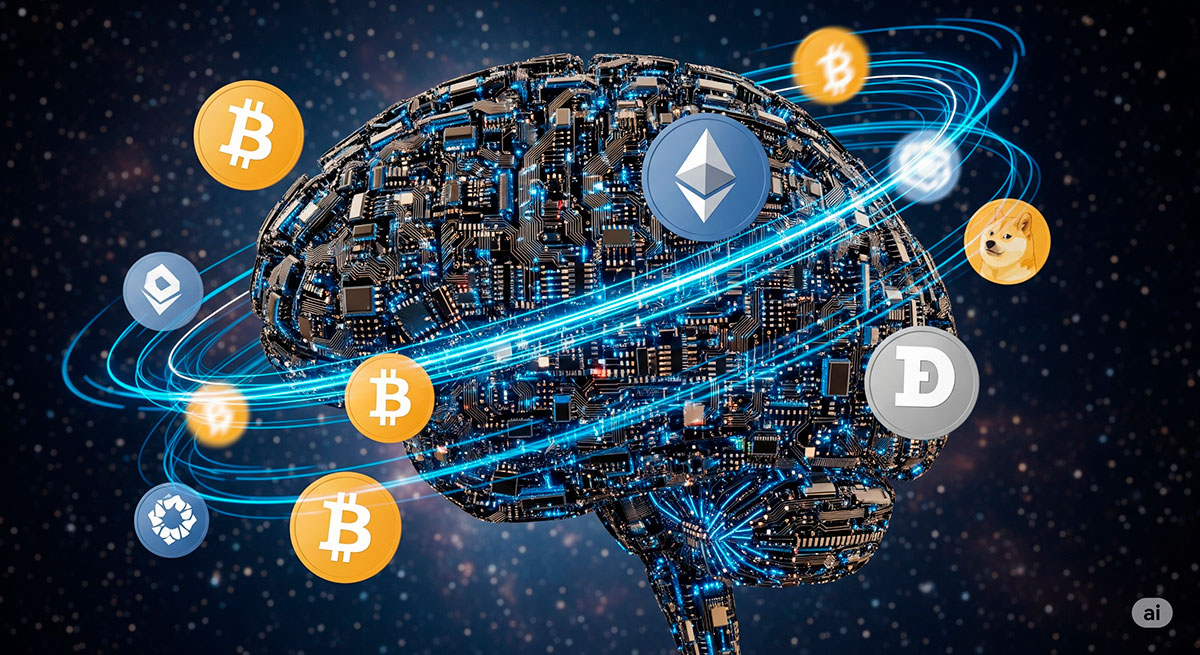Desde 'criptomonedas de IA' que potencian redes de computación descentralizada hasta algoritmos que gestionan miles de millones en DeFi, la simbiosis entre ambas tecnologías está creando una nueva frontera de innovación y riesgo.
Si la década pasada fue testigo del nacimiento explosivo de las criptomonedas, la actual está definida por su fusión con otra fuerza tecnológica transformadora: la Inteligencia Artificial. Lejos de ser una simple herramienta de análisis, la IA se está convirtiendo en el sistema nervioso central de un ecosistema cripto cada vez más complejo, una alianza que promete una eficiencia sin precedentes, pero que también introduce nuevos y desconocidos desafíos.
La manifestación más visible de esta convergencia son los llamados "proyectos de IA cripto". Firmas como Fetch.ai (FET) o SingularityNET (AGIX) han consolidado sus modelos, donde los tokens nativos no son meros activos especulativos. Funcionan como el combustible para economías digitales enteras: los tokens se utilizan para pagar por servicios de IA, acceder a datos para entrenar modelos o incluso para votar en la gobernanza de cómo se desarrollan y despliegan estos "cerebros" digitales.
"Estamos descentralizando el desarrollo y el acceso a la Inteligencia Artificial", explica Ben Goertzel, fundador de SingularityNET. "En lugar de que el poder de la IA se concentre en un puñado de gigantes tecnológicos, estamos creando un mercado abierto y global donde cualquiera puede contribuir y monetizar algoritmos de IA. La blockchain garantiza la transparencia y la equidad en este intercambio".
DeFi bajo gestión algorítmica
Pero es en el vertiginoso mundo de las finanzas descentralizadas (DeFi) donde el impacto de la IA es más inmediato y palpable. Los protocolos de gestión de activos, que mueven miles de millones de dólares, están integrando algoritmos de aprendizaje automático para optimizar estrategias de yield farming, mitigar riesgos de liquidación y protegerse contra hackeos en tiempo real.
Un ejemplo claro es el protocolo "Intelligent Portfolios" de la plataforma NexusAI, que utiliza una red neuronal para analizar miles de datos on-chain y de sentimiento de mercado. El sistema rebalancea automáticamente los fondos de los usuarios entre diferentes pools de liquidez y estrategias de préstamo para maximizar los retornos, una tarea humanamente imposible de realizar con la misma velocidad y eficiencia.
"La IA es el copiloto perfecto para DeFi", asegura un analista de la firma de datos blockchain Chainalysis. "Puede detectar vulnerabilidades en un contrato inteligente antes de que sean explotadas o identificar patrones de lavado de dinero que pasarían desapercibidos para un observador humano. Estamos pasando de un sistema financiero programable a uno verdaderamente autónomo e inteligente".
Una frontera de riesgos desconocidos
No obstante, esta nueva simbiosis no está exenta de peligros. La complejidad de estos sistemas de "caja negra" preocupa a los reguladores y a expertos en seguridad. ¿Qué ocurre si un algoritmo de IA comete un error catastrófico en la gestión de un protocolo DeFi, provocando liquidaciones en cascada? ¿Quién es el responsable: el desarrollador, los tenedores de tokens de gobernanza o la propia IA?
Además, la capacidad de la IA para generar deepfakes y desinformación a gran escala podría ser utilizada para manipular el sentimiento del mercado cripto, un sector ya de por sí volátil y susceptible a la especulación.
La carrera por la supremacía en la "IA cripto" ya ha comenzado. Proyectos compiten por atraer a los mejores desarrolladores y los conjuntos de datos más valiosos. Esta fusión no solo está creando herramientas más potentes, sino que está dando forma a una nueva infraestructura económica donde las decisiones de miles de millones de dólares podrían, muy pronto, ser tomadas no por un humano, sino por una mente digital que opera en la inmutable y transparente cadena de bloques. La revolución ya no solo se televisa, ahora también se computa.

































